Importance of Nursing Leadership and Teamwork in Healthcare
VerifiedAdded on 2023/01/16
|8
|1795
|40
AI Summary
This article discusses the importance of nursing leadership and teamwork in healthcare settings. It explores the role of nursing professionals in improving the quality of care and patient satisfaction. The article also highlights the factors that contribute to effective teamwork and communication among healthcare professionals.
Contribute Materials
Your contribution can guide someone’s learning journey. Share your
documents today.

Running head: ARTICLE ANALYSIS
ARTICLE ANALYSIS
Name of the student:
Name of the university:
Author note:
ARTICLE ANALYSIS
Name of the student:
Name of the university:
Author note:
Secure Best Marks with AI Grader
Need help grading? Try our AI Grader for instant feedback on your assignments.
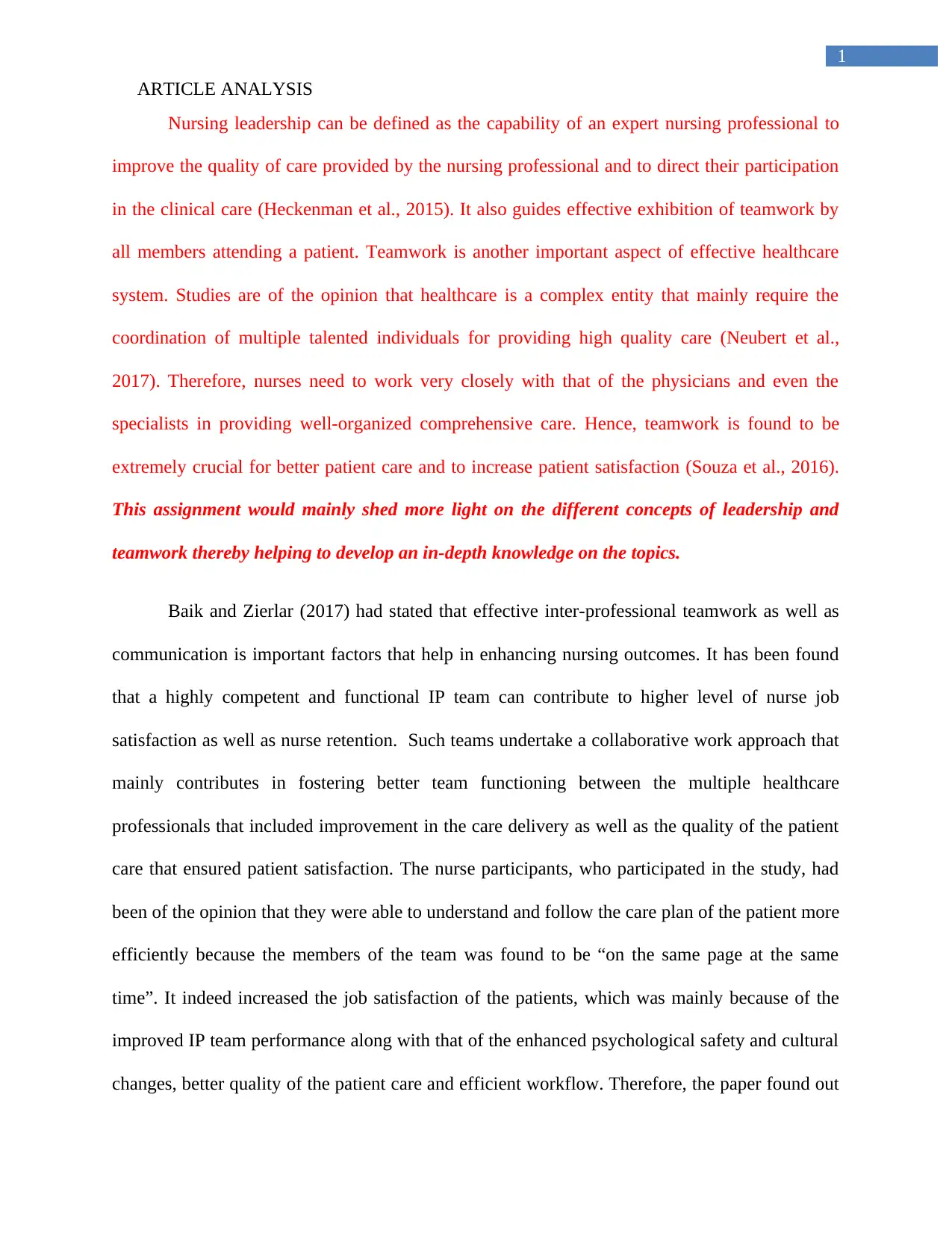
1
ARTICLE ANALYSIS
Nursing leadership can be defined as the capability of an expert nursing professional to
improve the quality of care provided by the nursing professional and to direct their participation
in the clinical care (Heckenman et al., 2015). It also guides effective exhibition of teamwork by
all members attending a patient. Teamwork is another important aspect of effective healthcare
system. Studies are of the opinion that healthcare is a complex entity that mainly require the
coordination of multiple talented individuals for providing high quality care (Neubert et al.,
2017). Therefore, nurses need to work very closely with that of the physicians and even the
specialists in providing well-organized comprehensive care. Hence, teamwork is found to be
extremely crucial for better patient care and to increase patient satisfaction (Souza et al., 2016).
This assignment would mainly shed more light on the different concepts of leadership and
teamwork thereby helping to develop an in-depth knowledge on the topics.
Baik and Zierlar (2017) had stated that effective inter-professional teamwork as well as
communication is important factors that help in enhancing nursing outcomes. It has been found
that a highly competent and functional IP team can contribute to higher level of nurse job
satisfaction as well as nurse retention. Such teams undertake a collaborative work approach that
mainly contributes in fostering better team functioning between the multiple healthcare
professionals that included improvement in the care delivery as well as the quality of the patient
care that ensured patient satisfaction. The nurse participants, who participated in the study, had
been of the opinion that they were able to understand and follow the care plan of the patient more
efficiently because the members of the team was found to be “on the same page at the same
time”. It indeed increased the job satisfaction of the patients, which was mainly because of the
improved IP team performance along with that of the enhanced psychological safety and cultural
changes, better quality of the patient care and efficient workflow. Therefore, the paper found out
ARTICLE ANALYSIS
Nursing leadership can be defined as the capability of an expert nursing professional to
improve the quality of care provided by the nursing professional and to direct their participation
in the clinical care (Heckenman et al., 2015). It also guides effective exhibition of teamwork by
all members attending a patient. Teamwork is another important aspect of effective healthcare
system. Studies are of the opinion that healthcare is a complex entity that mainly require the
coordination of multiple talented individuals for providing high quality care (Neubert et al.,
2017). Therefore, nurses need to work very closely with that of the physicians and even the
specialists in providing well-organized comprehensive care. Hence, teamwork is found to be
extremely crucial for better patient care and to increase patient satisfaction (Souza et al., 2016).
This assignment would mainly shed more light on the different concepts of leadership and
teamwork thereby helping to develop an in-depth knowledge on the topics.
Baik and Zierlar (2017) had stated that effective inter-professional teamwork as well as
communication is important factors that help in enhancing nursing outcomes. It has been found
that a highly competent and functional IP team can contribute to higher level of nurse job
satisfaction as well as nurse retention. Such teams undertake a collaborative work approach that
mainly contributes in fostering better team functioning between the multiple healthcare
professionals that included improvement in the care delivery as well as the quality of the patient
care that ensured patient satisfaction. The nurse participants, who participated in the study, had
been of the opinion that they were able to understand and follow the care plan of the patient more
efficiently because the members of the team was found to be “on the same page at the same
time”. It indeed increased the job satisfaction of the patients, which was mainly because of the
improved IP team performance along with that of the enhanced psychological safety and cultural
changes, better quality of the patient care and efficient workflow. Therefore, the paper found out
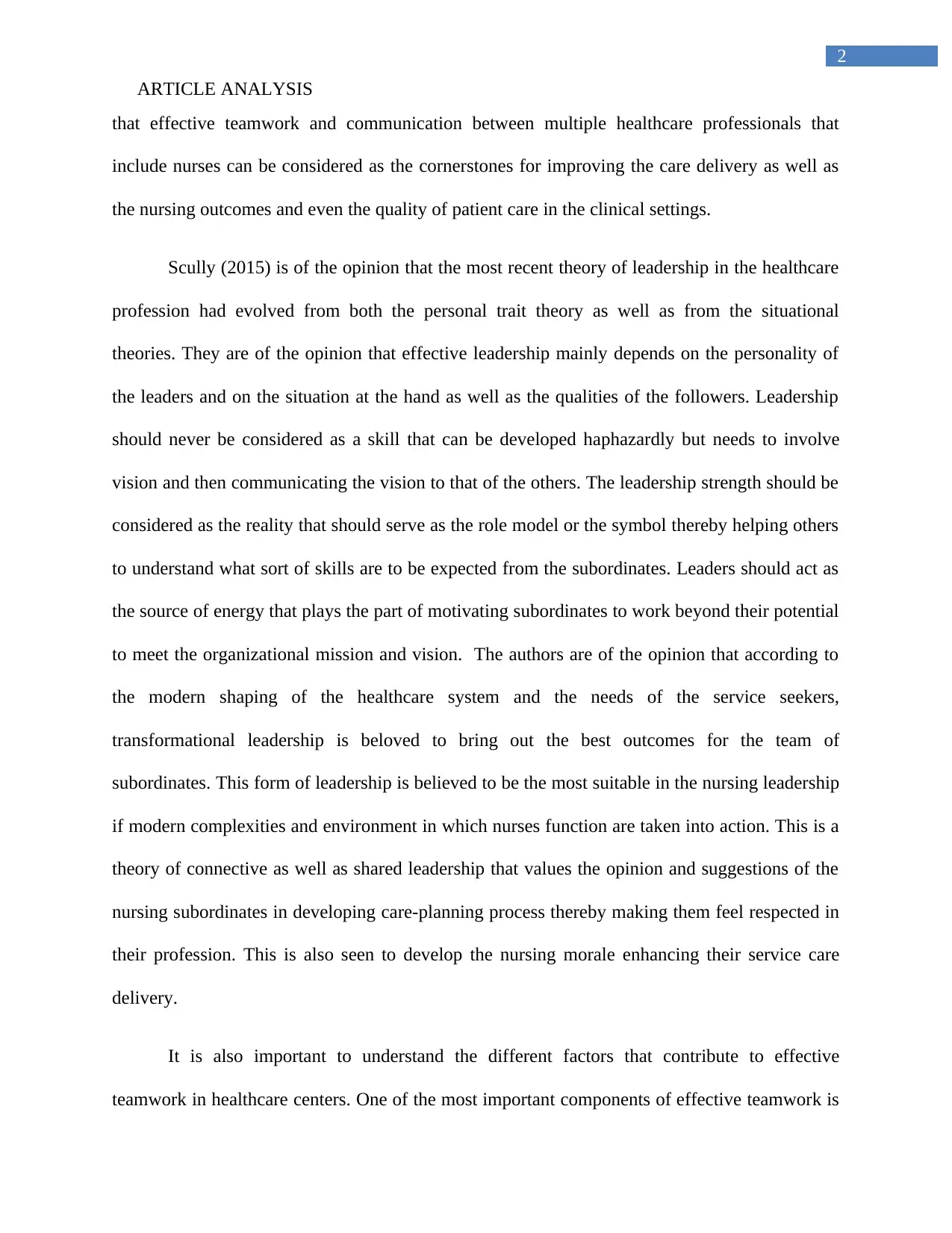
2
ARTICLE ANALYSIS
that effective teamwork and communication between multiple healthcare professionals that
include nurses can be considered as the cornerstones for improving the care delivery as well as
the nursing outcomes and even the quality of patient care in the clinical settings.
Scully (2015) is of the opinion that the most recent theory of leadership in the healthcare
profession had evolved from both the personal trait theory as well as from the situational
theories. They are of the opinion that effective leadership mainly depends on the personality of
the leaders and on the situation at the hand as well as the qualities of the followers. Leadership
should never be considered as a skill that can be developed haphazardly but needs to involve
vision and then communicating the vision to that of the others. The leadership strength should be
considered as the reality that should serve as the role model or the symbol thereby helping others
to understand what sort of skills are to be expected from the subordinates. Leaders should act as
the source of energy that plays the part of motivating subordinates to work beyond their potential
to meet the organizational mission and vision. The authors are of the opinion that according to
the modern shaping of the healthcare system and the needs of the service seekers,
transformational leadership is beloved to bring out the best outcomes for the team of
subordinates. This form of leadership is believed to be the most suitable in the nursing leadership
if modern complexities and environment in which nurses function are taken into action. This is a
theory of connective as well as shared leadership that values the opinion and suggestions of the
nursing subordinates in developing care-planning process thereby making them feel respected in
their profession. This is also seen to develop the nursing morale enhancing their service care
delivery.
It is also important to understand the different factors that contribute to effective
teamwork in healthcare centers. One of the most important components of effective teamwork is
ARTICLE ANALYSIS
that effective teamwork and communication between multiple healthcare professionals that
include nurses can be considered as the cornerstones for improving the care delivery as well as
the nursing outcomes and even the quality of patient care in the clinical settings.
Scully (2015) is of the opinion that the most recent theory of leadership in the healthcare
profession had evolved from both the personal trait theory as well as from the situational
theories. They are of the opinion that effective leadership mainly depends on the personality of
the leaders and on the situation at the hand as well as the qualities of the followers. Leadership
should never be considered as a skill that can be developed haphazardly but needs to involve
vision and then communicating the vision to that of the others. The leadership strength should be
considered as the reality that should serve as the role model or the symbol thereby helping others
to understand what sort of skills are to be expected from the subordinates. Leaders should act as
the source of energy that plays the part of motivating subordinates to work beyond their potential
to meet the organizational mission and vision. The authors are of the opinion that according to
the modern shaping of the healthcare system and the needs of the service seekers,
transformational leadership is beloved to bring out the best outcomes for the team of
subordinates. This form of leadership is believed to be the most suitable in the nursing leadership
if modern complexities and environment in which nurses function are taken into action. This is a
theory of connective as well as shared leadership that values the opinion and suggestions of the
nursing subordinates in developing care-planning process thereby making them feel respected in
their profession. This is also seen to develop the nursing morale enhancing their service care
delivery.
It is also important to understand the different factors that contribute to effective
teamwork in healthcare centers. One of the most important components of effective teamwork is
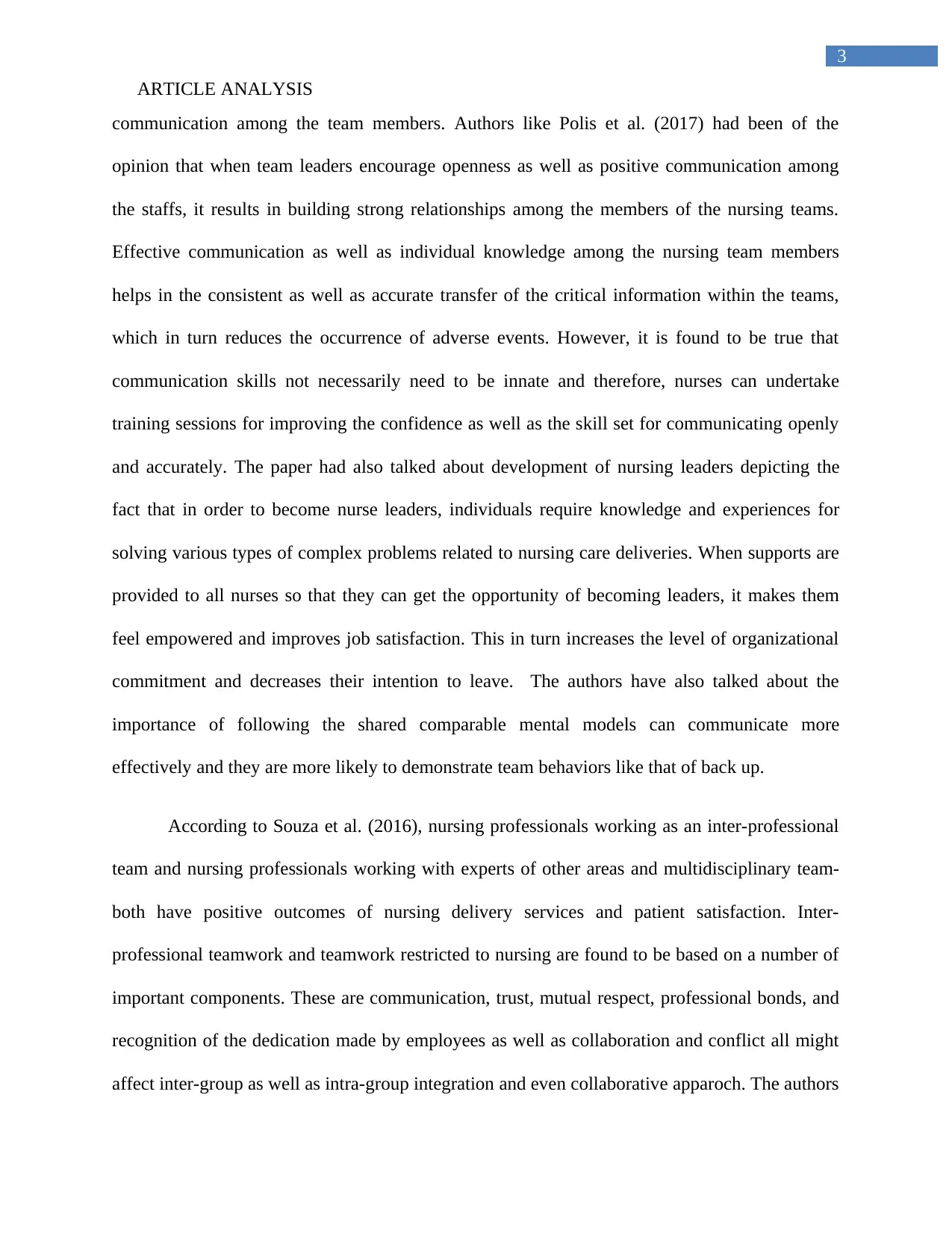
3
ARTICLE ANALYSIS
communication among the team members. Authors like Polis et al. (2017) had been of the
opinion that when team leaders encourage openness as well as positive communication among
the staffs, it results in building strong relationships among the members of the nursing teams.
Effective communication as well as individual knowledge among the nursing team members
helps in the consistent as well as accurate transfer of the critical information within the teams,
which in turn reduces the occurrence of adverse events. However, it is found to be true that
communication skills not necessarily need to be innate and therefore, nurses can undertake
training sessions for improving the confidence as well as the skill set for communicating openly
and accurately. The paper had also talked about development of nursing leaders depicting the
fact that in order to become nurse leaders, individuals require knowledge and experiences for
solving various types of complex problems related to nursing care deliveries. When supports are
provided to all nurses so that they can get the opportunity of becoming leaders, it makes them
feel empowered and improves job satisfaction. This in turn increases the level of organizational
commitment and decreases their intention to leave. The authors have also talked about the
importance of following the shared comparable mental models can communicate more
effectively and they are more likely to demonstrate team behaviors like that of back up.
According to Souza et al. (2016), nursing professionals working as an inter-professional
team and nursing professionals working with experts of other areas and multidisciplinary team-
both have positive outcomes of nursing delivery services and patient satisfaction. Inter-
professional teamwork and teamwork restricted to nursing are found to be based on a number of
important components. These are communication, trust, mutual respect, professional bonds, and
recognition of the dedication made by employees as well as collaboration and conflict all might
affect inter-group as well as intra-group integration and even collaborative apparoch. The authors
ARTICLE ANALYSIS
communication among the team members. Authors like Polis et al. (2017) had been of the
opinion that when team leaders encourage openness as well as positive communication among
the staffs, it results in building strong relationships among the members of the nursing teams.
Effective communication as well as individual knowledge among the nursing team members
helps in the consistent as well as accurate transfer of the critical information within the teams,
which in turn reduces the occurrence of adverse events. However, it is found to be true that
communication skills not necessarily need to be innate and therefore, nurses can undertake
training sessions for improving the confidence as well as the skill set for communicating openly
and accurately. The paper had also talked about development of nursing leaders depicting the
fact that in order to become nurse leaders, individuals require knowledge and experiences for
solving various types of complex problems related to nursing care deliveries. When supports are
provided to all nurses so that they can get the opportunity of becoming leaders, it makes them
feel empowered and improves job satisfaction. This in turn increases the level of organizational
commitment and decreases their intention to leave. The authors have also talked about the
importance of following the shared comparable mental models can communicate more
effectively and they are more likely to demonstrate team behaviors like that of back up.
According to Souza et al. (2016), nursing professionals working as an inter-professional
team and nursing professionals working with experts of other areas and multidisciplinary team-
both have positive outcomes of nursing delivery services and patient satisfaction. Inter-
professional teamwork and teamwork restricted to nursing are found to be based on a number of
important components. These are communication, trust, mutual respect, professional bonds, and
recognition of the dedication made by employees as well as collaboration and conflict all might
affect inter-group as well as intra-group integration and even collaborative apparoch. The authors
Secure Best Marks with AI Grader
Need help grading? Try our AI Grader for instant feedback on your assignments.
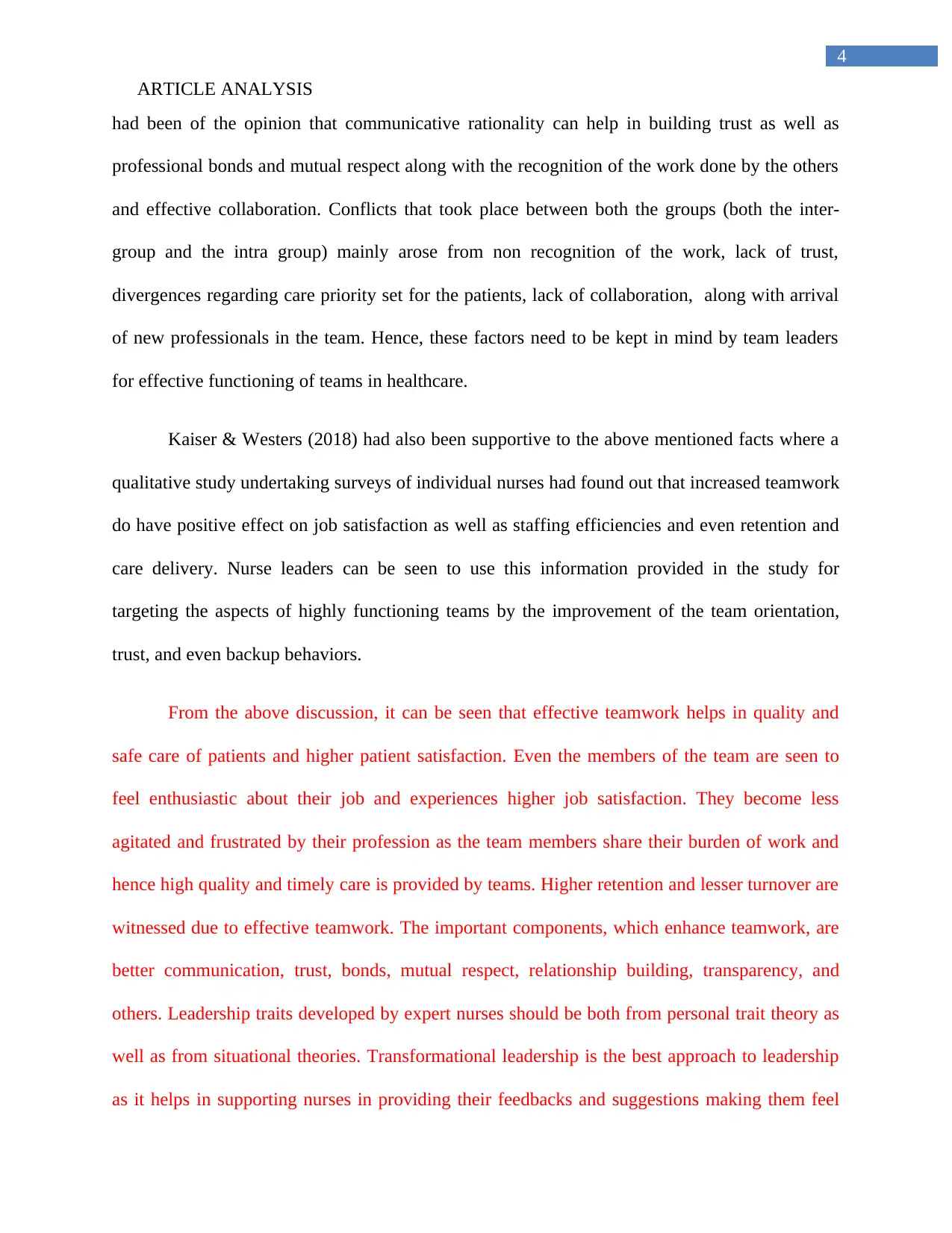
4
ARTICLE ANALYSIS
had been of the opinion that communicative rationality can help in building trust as well as
professional bonds and mutual respect along with the recognition of the work done by the others
and effective collaboration. Conflicts that took place between both the groups (both the inter-
group and the intra group) mainly arose from non recognition of the work, lack of trust,
divergences regarding care priority set for the patients, lack of collaboration, along with arrival
of new professionals in the team. Hence, these factors need to be kept in mind by team leaders
for effective functioning of teams in healthcare.
Kaiser & Westers (2018) had also been supportive to the above mentioned facts where a
qualitative study undertaking surveys of individual nurses had found out that increased teamwork
do have positive effect on job satisfaction as well as staffing efficiencies and even retention and
care delivery. Nurse leaders can be seen to use this information provided in the study for
targeting the aspects of highly functioning teams by the improvement of the team orientation,
trust, and even backup behaviors.
From the above discussion, it can be seen that effective teamwork helps in quality and
safe care of patients and higher patient satisfaction. Even the members of the team are seen to
feel enthusiastic about their job and experiences higher job satisfaction. They become less
agitated and frustrated by their profession as the team members share their burden of work and
hence high quality and timely care is provided by teams. Higher retention and lesser turnover are
witnessed due to effective teamwork. The important components, which enhance teamwork, are
better communication, trust, bonds, mutual respect, relationship building, transparency, and
others. Leadership traits developed by expert nurses should be both from personal trait theory as
well as from situational theories. Transformational leadership is the best approach to leadership
as it helps in supporting nurses in providing their feedbacks and suggestions making them feel
ARTICLE ANALYSIS
had been of the opinion that communicative rationality can help in building trust as well as
professional bonds and mutual respect along with the recognition of the work done by the others
and effective collaboration. Conflicts that took place between both the groups (both the inter-
group and the intra group) mainly arose from non recognition of the work, lack of trust,
divergences regarding care priority set for the patients, lack of collaboration, along with arrival
of new professionals in the team. Hence, these factors need to be kept in mind by team leaders
for effective functioning of teams in healthcare.
Kaiser & Westers (2018) had also been supportive to the above mentioned facts where a
qualitative study undertaking surveys of individual nurses had found out that increased teamwork
do have positive effect on job satisfaction as well as staffing efficiencies and even retention and
care delivery. Nurse leaders can be seen to use this information provided in the study for
targeting the aspects of highly functioning teams by the improvement of the team orientation,
trust, and even backup behaviors.
From the above discussion, it can be seen that effective teamwork helps in quality and
safe care of patients and higher patient satisfaction. Even the members of the team are seen to
feel enthusiastic about their job and experiences higher job satisfaction. They become less
agitated and frustrated by their profession as the team members share their burden of work and
hence high quality and timely care is provided by teams. Higher retention and lesser turnover are
witnessed due to effective teamwork. The important components, which enhance teamwork, are
better communication, trust, bonds, mutual respect, relationship building, transparency, and
others. Leadership traits developed by expert nurses should be both from personal trait theory as
well as from situational theories. Transformational leadership is the best approach to leadership
as it helps in supporting nurses in providing their feedbacks and suggestions making them feel

5
ARTICLE ANALYSIS
that their feedbacks are respected. This leadership style helps nurses to feel motivated and work
beyond their potential to reach the zenith of success.
ARTICLE ANALYSIS
that their feedbacks are respected. This leadership style helps nurses to feel motivated and work
beyond their potential to reach the zenith of success.
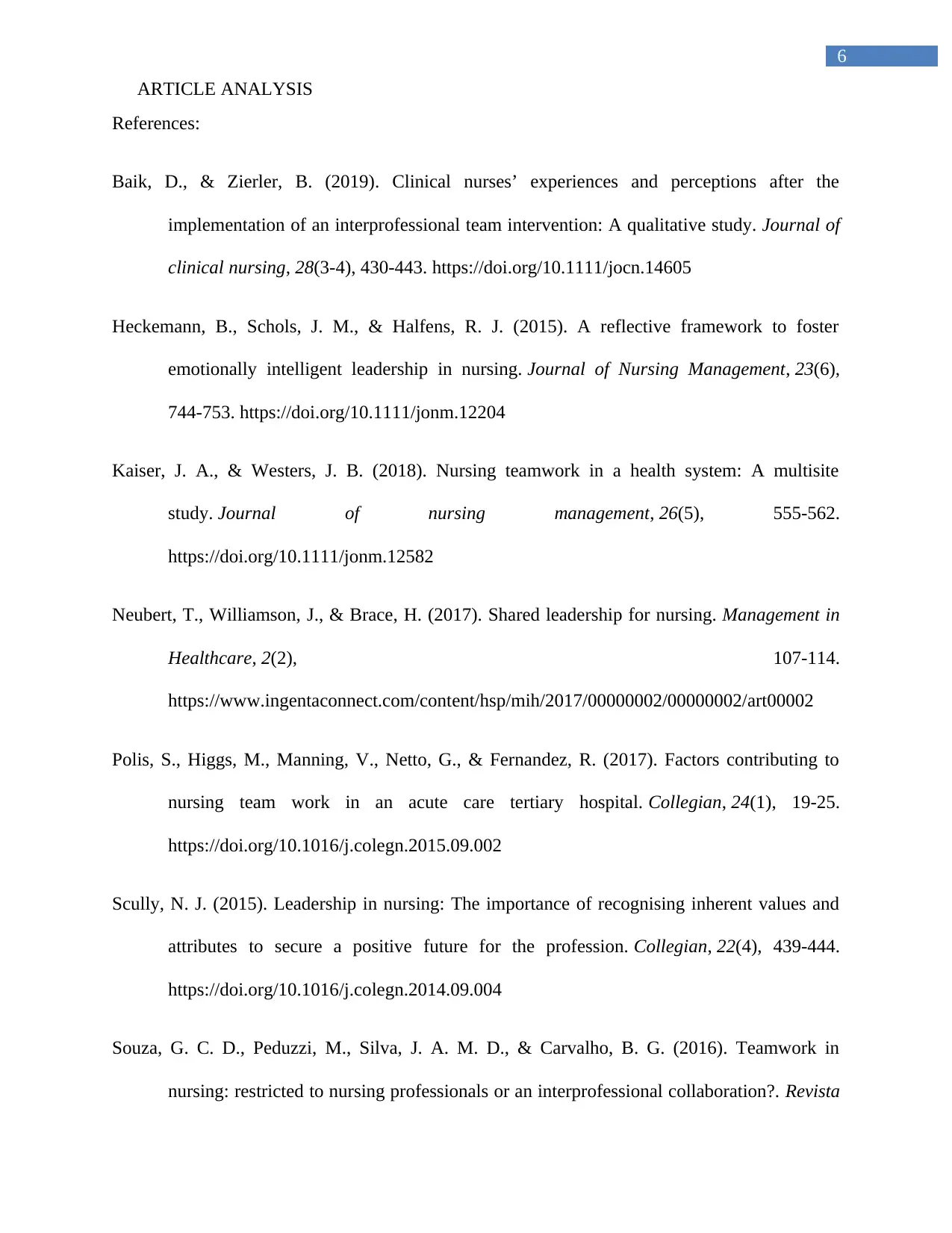
6
ARTICLE ANALYSIS
References:
Baik, D., & Zierler, B. (2019). Clinical nurses’ experiences and perceptions after the
implementation of an interprofessional team intervention: A qualitative study. Journal of
clinical nursing, 28(3-4), 430-443. https://doi.org/10.1111/jocn.14605
Heckemann, B., Schols, J. M., & Halfens, R. J. (2015). A reflective framework to foster
emotionally intelligent leadership in nursing. Journal of Nursing Management, 23(6),
744-753. https://doi.org/10.1111/jonm.12204
Kaiser, J. A., & Westers, J. B. (2018). Nursing teamwork in a health system: A multisite
study. Journal of nursing management, 26(5), 555-562.
https://doi.org/10.1111/jonm.12582
Neubert, T., Williamson, J., & Brace, H. (2017). Shared leadership for nursing. Management in
Healthcare, 2(2), 107-114.
https://www.ingentaconnect.com/content/hsp/mih/2017/00000002/00000002/art00002
Polis, S., Higgs, M., Manning, V., Netto, G., & Fernandez, R. (2017). Factors contributing to
nursing team work in an acute care tertiary hospital. Collegian, 24(1), 19-25.
https://doi.org/10.1016/j.colegn.2015.09.002
Scully, N. J. (2015). Leadership in nursing: The importance of recognising inherent values and
attributes to secure a positive future for the profession. Collegian, 22(4), 439-444.
https://doi.org/10.1016/j.colegn.2014.09.004
Souza, G. C. D., Peduzzi, M., Silva, J. A. M. D., & Carvalho, B. G. (2016). Teamwork in
nursing: restricted to nursing professionals or an interprofessional collaboration?. Revista
ARTICLE ANALYSIS
References:
Baik, D., & Zierler, B. (2019). Clinical nurses’ experiences and perceptions after the
implementation of an interprofessional team intervention: A qualitative study. Journal of
clinical nursing, 28(3-4), 430-443. https://doi.org/10.1111/jocn.14605
Heckemann, B., Schols, J. M., & Halfens, R. J. (2015). A reflective framework to foster
emotionally intelligent leadership in nursing. Journal of Nursing Management, 23(6),
744-753. https://doi.org/10.1111/jonm.12204
Kaiser, J. A., & Westers, J. B. (2018). Nursing teamwork in a health system: A multisite
study. Journal of nursing management, 26(5), 555-562.
https://doi.org/10.1111/jonm.12582
Neubert, T., Williamson, J., & Brace, H. (2017). Shared leadership for nursing. Management in
Healthcare, 2(2), 107-114.
https://www.ingentaconnect.com/content/hsp/mih/2017/00000002/00000002/art00002
Polis, S., Higgs, M., Manning, V., Netto, G., & Fernandez, R. (2017). Factors contributing to
nursing team work in an acute care tertiary hospital. Collegian, 24(1), 19-25.
https://doi.org/10.1016/j.colegn.2015.09.002
Scully, N. J. (2015). Leadership in nursing: The importance of recognising inherent values and
attributes to secure a positive future for the profession. Collegian, 22(4), 439-444.
https://doi.org/10.1016/j.colegn.2014.09.004
Souza, G. C. D., Peduzzi, M., Silva, J. A. M. D., & Carvalho, B. G. (2016). Teamwork in
nursing: restricted to nursing professionals or an interprofessional collaboration?. Revista
Paraphrase This Document
Need a fresh take? Get an instant paraphrase of this document with our AI Paraphraser

7
ARTICLE ANALYSIS
da Escola de Enfermagem da USP, 50(4), 642-649. http://dx.doi.org/10.1590/S0080-
623420160000500015
ARTICLE ANALYSIS
da Escola de Enfermagem da USP, 50(4), 642-649. http://dx.doi.org/10.1590/S0080-
623420160000500015
1 out of 8
Related Documents
Your All-in-One AI-Powered Toolkit for Academic Success.
+13062052269
info@desklib.com
Available 24*7 on WhatsApp / Email
![[object Object]](/_next/static/media/star-bottom.7253800d.svg)
Unlock your academic potential
© 2024 | Zucol Services PVT LTD | All rights reserved.





